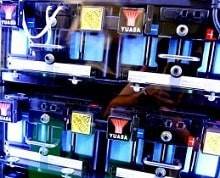- Contact 0870 350 7767
- |
- Advertise
Choosing a generator for data centre power protection
 News and PR from Kohler Uninterruptible Power - Published 23 July 2015
UPS generators are no longer just a backup plan. Today, they are considered a vital component of a companyís power protection policy, as sizing UPS batteries for protracted power blackouts is simply uneconomic and impractical. In choosing a generator for a data centre or other critical IT load application, a number of factors must be considered. These include the generatorís key components, environmental issues and the qualifications of the suppliers as well as compatibility with the UPS to be supported.
In this article, Alan Luscombe, director at Uninterruptible Power Supplies Ltd., a Kohler company, discusses how generators work with UPSs, and the factors you must consider when choosing a generator as part of your power protection policy.
News and PR from Kohler Uninterruptible Power - Published 23 July 2015
UPS generators are no longer just a backup plan. Today, they are considered a vital component of a companyís power protection policy, as sizing UPS batteries for protracted power blackouts is simply uneconomic and impractical. In choosing a generator for a data centre or other critical IT load application, a number of factors must be considered. These include the generatorís key components, environmental issues and the qualifications of the suppliers as well as compatibility with the UPS to be supported.
In this article, Alan Luscombe, director at Uninterruptible Power Supplies Ltd., a Kohler company, discusses how generators work with UPSs, and the factors you must consider when choosing a generator as part of your power protection policy. UPSs and generators working together
In some applications, it may be acceptable to use the battery autonomy to gradually reduce the load if the blackout time is extended. However, for critical applications that must remain up and running through power blackouts of any length, a matched UPS-generator arrangement becomes the only practical solution. To ensure continuity of power throughout a blackout event, UPS, generator and an Automatic Mains Failure (AMF) Detection panel are needed to work together. When the mains initially fail, the UPS batteries support the load during a pre-set AMF delay time. If this period expires, the generator starts up and the UPS detects the generator power, using it to feed the load and recharge the depleted batteries. The generator runs until mains power is restored and stabilised, and is then shut down under AMF control while the UPS reverts to mains. UPS battery power covers the short power interruption during this transfer.
A backup generator set comprises a stored energy source, an engine, an alternator, a control panel and the AMF panel. Although both gas and diesel-powered engines are available, standby generators are normally diesel-powered. Engine suppliers include John Deere, Volvo and Mitsubishi, for which different control panels with varying capabilities are available. Standard types provide automatic and manual generator control while providing the basic indication of operational parameters, which includes voltage, frequency, coolant temperature, oil pressure and battery voltage, plus alarm and fault indication. More advanced panels offer more sophisticated user interface displays and enhanced diagnostic capabilities. Remote monitoring and control via Ethernet, RS485 or USB ports as well as fault-finding and alarm diagnostics are also possible.
Whichever configuration is chosen, generators must be compatible with the UPS and all other power equipment to guarantee an uninterrupted power supply. Ensuring compatibility can be considerably simplified by sourcing UPS and generator from a single supplier, who offers proven, matched generator/UPS sets. An issue can be the generator output frequency. If its range is outside the UPS’s tolerance, the UPS cannot synchronise with the generator without endangering its load.
Other announcements from Kohler Uninterruptible Power
-
Understanding your UPS batteryís amp-hour rating
If youíre specifying a UPS system, then itís absolutely essential that you truly understand its battery autonomy; for how long will it support the load if the AC supplies fail?
14 May 2018
-
Keeping UPS availability high
When data centre operators invest in UPS systems, itís for one purpose only; to maximise power availability for their facilityís ICT equipment.
14 May 2018
-
Future trends for UPSs
What does the future hold for UPS technologies and systems? We asked Alan Luscombe, Director at UPSL, for his views, as summarised below.
02 Nov 2017
-
UPS, heal thyself
UPSs exist solely to deliver clean, uninterrupted power to their critical load Ė but their ability to do so is entirely bounded by their resilience to failure of their own components or subsystems.
31 Aug 2017
-
Maintaining UPS efficiency when the load size diminishes
Modular UPS technology, as implemented in systems such as UPSLís PowerWAVE 9500DPA, is now being exploited in a smart solution that maintains UPS efficiency even when the UPS load is severely reduced.
30 Aug 2017
-
Is it time to consider Lithium-ion batteries?
Why hasnít the industry adopted lithium-ion solutions with greater enthusiasm, and is this likely to change? We can answer these by looking at factors relating to both lead-acid and lithium-ion bat.
30 Aug 2017
-
How UPS efficiency can contribute to data centre PUE
Improving UPS efficiency can help to better data centre PUE performance. The article discusses the options for this available to UPS operators who invest in the right, transformerless technology UPSs.
30 Aug 2017
-
The Internet of Things, data centres, and UPSs
The Internet of Things (IoT) is gaining traction at an accelerating pace; Gartner has predicted 26 billion connected devices by 2020, while others are calling even higher numbers.
30 Aug 2017
-
Director's Blog: So just what exactly is a UPS?
This blog written by Alan Luscombe, UPS Ltd Director, explains what a UPS is, as well as putting the various risks averted by UPS systems into perspective.
03 Aug 2015










